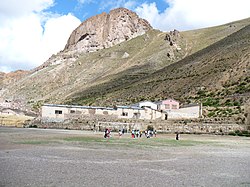Tatasi is a small town in Bolivia in the Potosí Department, in Sud Chichas Province, Atocha Municipality. It is situated at the Tatasi River and located at the foothills of the Cordillera de Lípez.
Tatasi | |
|---|---|
Town | |
 Tatasi | |
| Country | Bolivia |
| Department | Potosí Department |
| Province | Sud Chichas Province |
| Municipality | Atocha Municipality |
| Canton | Portugalete Canton |
| Elevation | 13,337 ft (4,065 m) |
| Population (2001) | |
| • Total | 674 |
| Time zone | UTC-4 (BST) |
Location edit
Tatasi is the most populous settlement in the canton of Portugalete and lies in the district (Bolivian : Municipio) Atocha in the province of Sur Chichas.[1] The village is located at an altitude of 4065m in a high mountain depression on the irregularly flowing Río Tatasi, one of the source rivers of the Río Tupiza. Tatasi is framed by ridges that rise to an altitude of 4,460 meters, surrounding the town almost entirely. Almost three kilometers west of Tatasi is the uninhabited ghost village of Portugalete and the mining colony at the Tatasi-Portugalete Mine, which were abandoned in the 19th century after the silver mines there were exhausted and the mining colonies there moved on.[2]
Geography edit
Tatasi is located on the Bolivian Altiplano, in the northern foothills of the Cordillera de Lípez. The climate of the region is arid and has a clear time of day, in which the average daily temperature fluctuations are stronger than the temperature fluctuations over the course of the year.[3]
The terrain around Tatasi is mainly hilly, but to the northeast it is flat. Tatasi is located on a hill. The highest point in the vicinity is 4471 meters above sea level, 1.1 km south of Tatasi. Around Tatasi it is very sparsely populated, with 5 inhabitants per square kilometer.
The surroundings around Tatasi are mainly an open bush landscape.[4]
The Tatasi River and Alexandrabetha River both run southeast through the town until joining the Tupiza River.[5]
Transportation edit
Tatasi is located 340 kilometers south of Potosí, the capital of the department of the same name.[6]
From Potosí, the truck road Ruta 5 leads in a southwesterly direction 208 kilometers to Uyuni, from there it travels for another 96 kilometers to Atocha. From Atocha, a country road leads southeast along the old railway line for 23 kilometers to Escoriani, and then leaves the railway line in a southwesterly direction, where it reaches Tatasi after thirteen kilometers. From there it continues via San Vicente to the neighboring provincial capital of San Pablo de Lípez.
Population edit
The population of the village has almost halved in the last decade of the 20th century, but has increased slightly since the turn of the century.
| Year | Population | Source |
|---|---|---|
| 1992 | 1,328 | 1992 Census[1] |
| 2001 | 674 | 2001 Census[2] |
| 2012 | 770 | 2012 Census[3] |
Due to the historically native-grown population distribution, the region has a high proportion of Quechua population. In the Municipio Atocha, 60.1 percent of the population speak the Quechua language.[2]
There are about 5 people per square kilometer in the area.[7]
Climate edit
There is a cold desert climate in the area.[8]
The region's mean annual temperature is around 6 °C, with a monthly average of almost 2 °C in the summer, and 8 to 9 °C from November to March. The annual rainfall is a low 200 mm, with the months of April to October being almost free of precipitation.[2] Significant rainfall occurs only from November to March, with a maximum of about 50 mm monthly precipitation in January.
| ||||||||||||||||||||||||||||||||||||||||||||||||||||||||||||||||||||||||||||||||||||||||||||||||||||||||||||||||||||||||||||
References edit
- ^ a b INE – Instituto Nacional de Estadística Bolivia 1992.
- ^ a b c d INE – Instituto Nacional de Estadística Bolivia 2001.
- ^ a b INE – Instituto Nacional de Estadística Bolivia 2012. at the Wayback Machine (archived 4 March 2016)
- ^ "Land Cover Classification (1 year) | NASA". Land Cover Classification (1 year) | NASA. 25 September 2020. Retrieved 25 September 2020.
- ^ "Tupiza | Bolivia". Encyclopedia Britannica. Retrieved 23 April 2020.
- ^ "City of Potosí". UNESCO World Heritage Centre. Retrieved 23 April 2020.
- ^ "Population Density | NASA". Population Density | NASA. 1 June 2020. Retrieved 11 June 2020.
- ^ Peel, M. C.; Finlayson, B. L.; McMahon, T. A. (11 October 2007). "Updated world map of the Köppen-Geiger climate classification". Hydrology and Earth System Sciences. 11 (5): 1633–1644. doi:10.5194/hess-11-1633-2007. ISSN 1027-5606.
- ^ "NASA Earth Observations Data Set Index". NASA. Retrieved 30 January 2016.